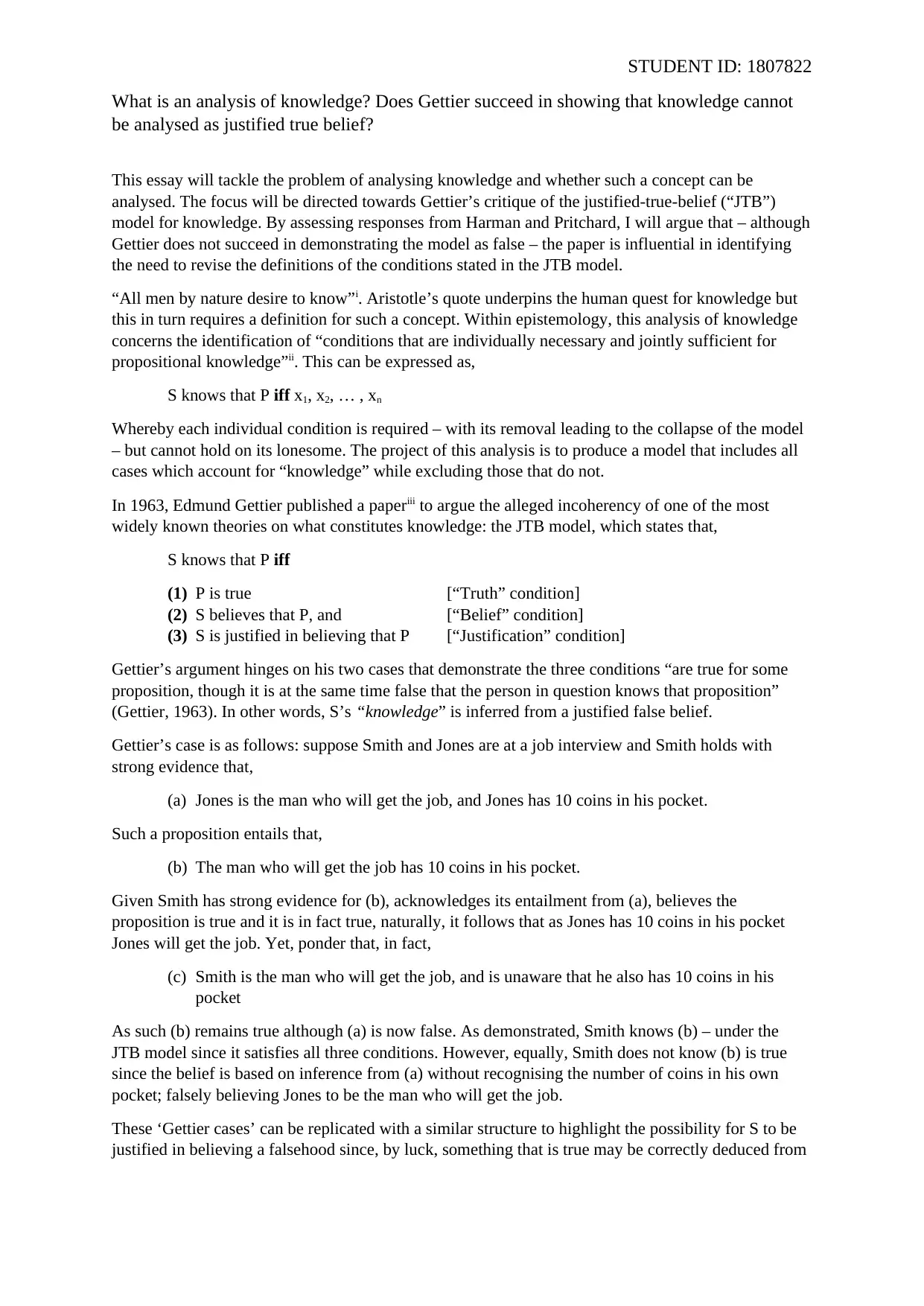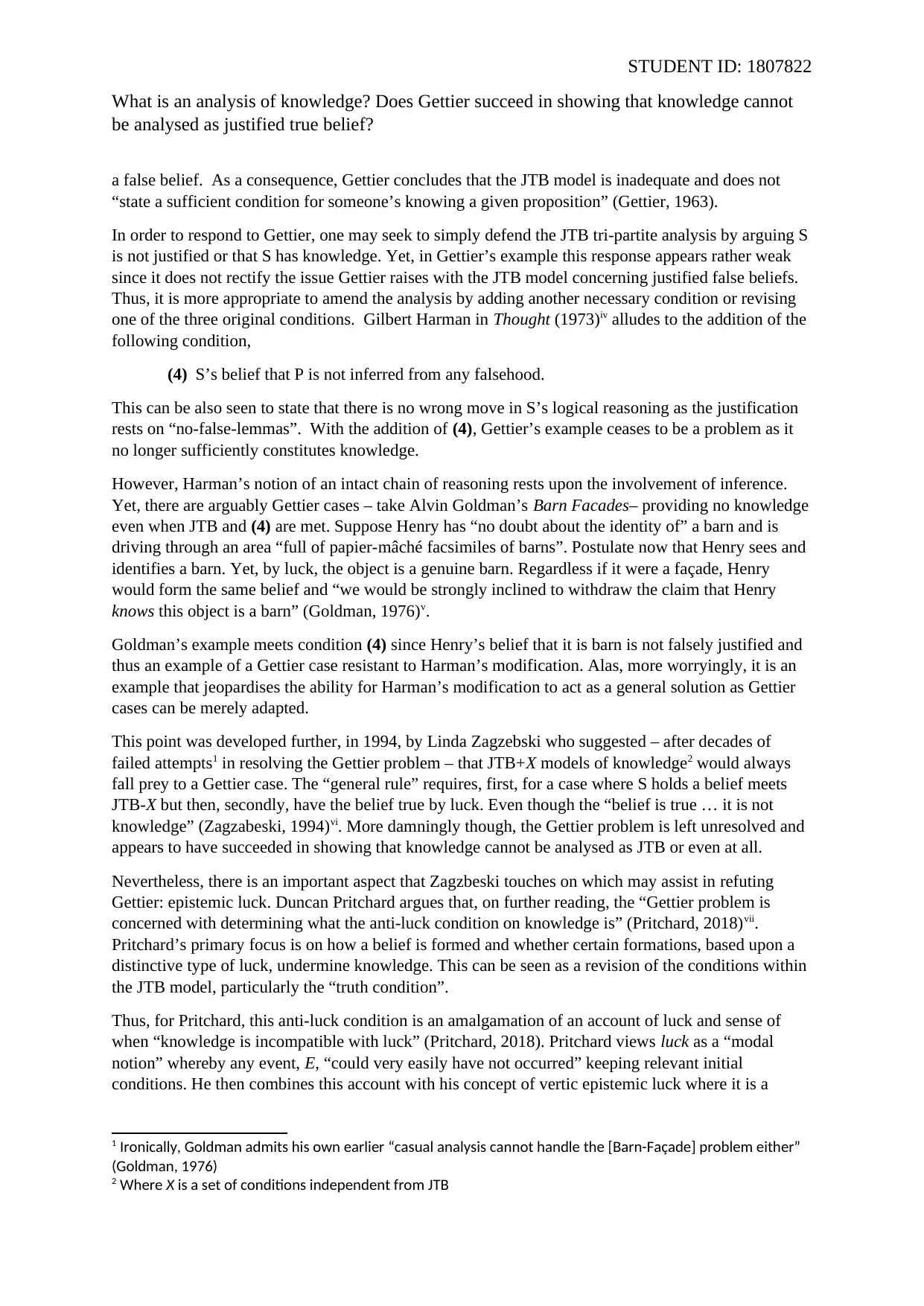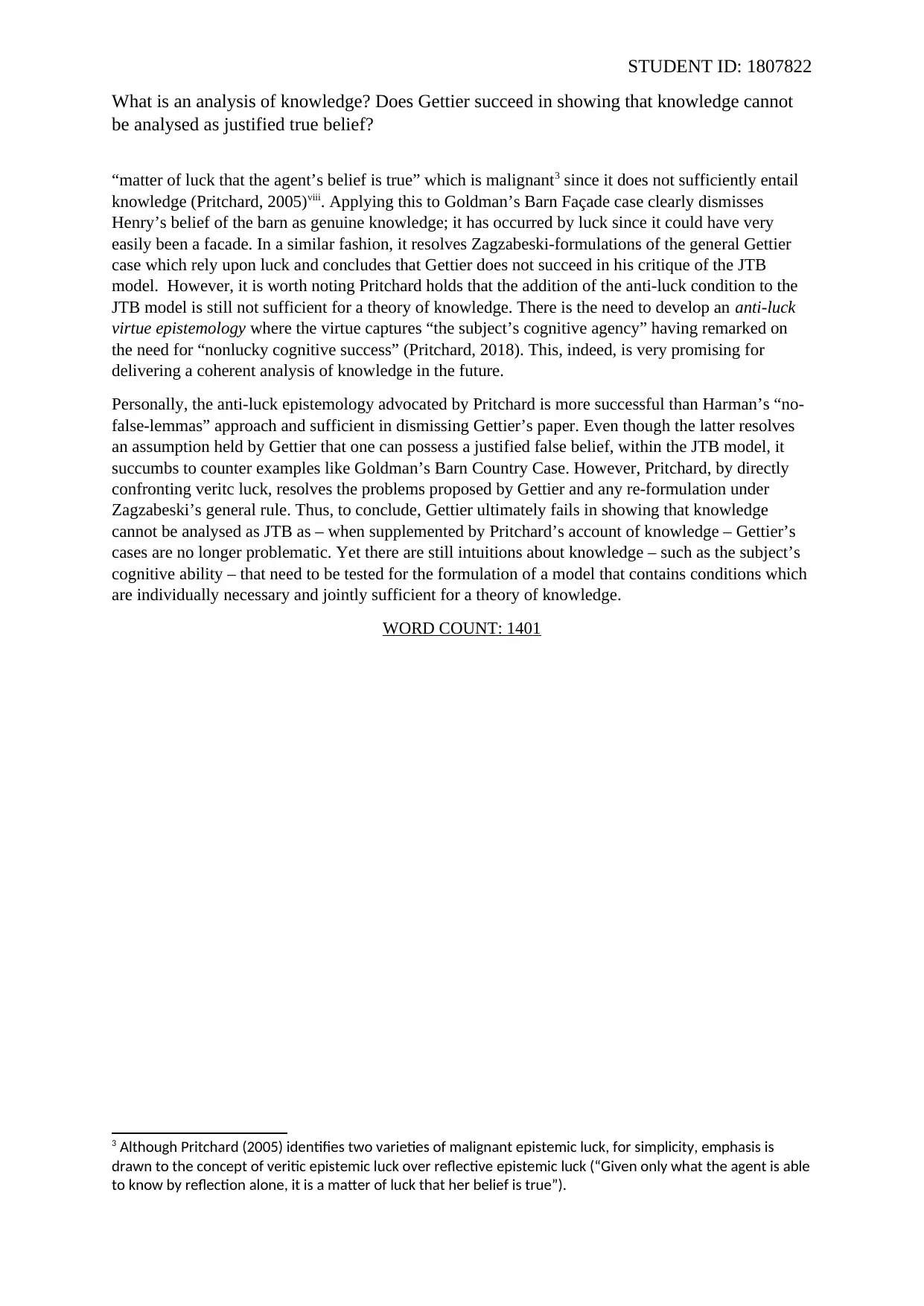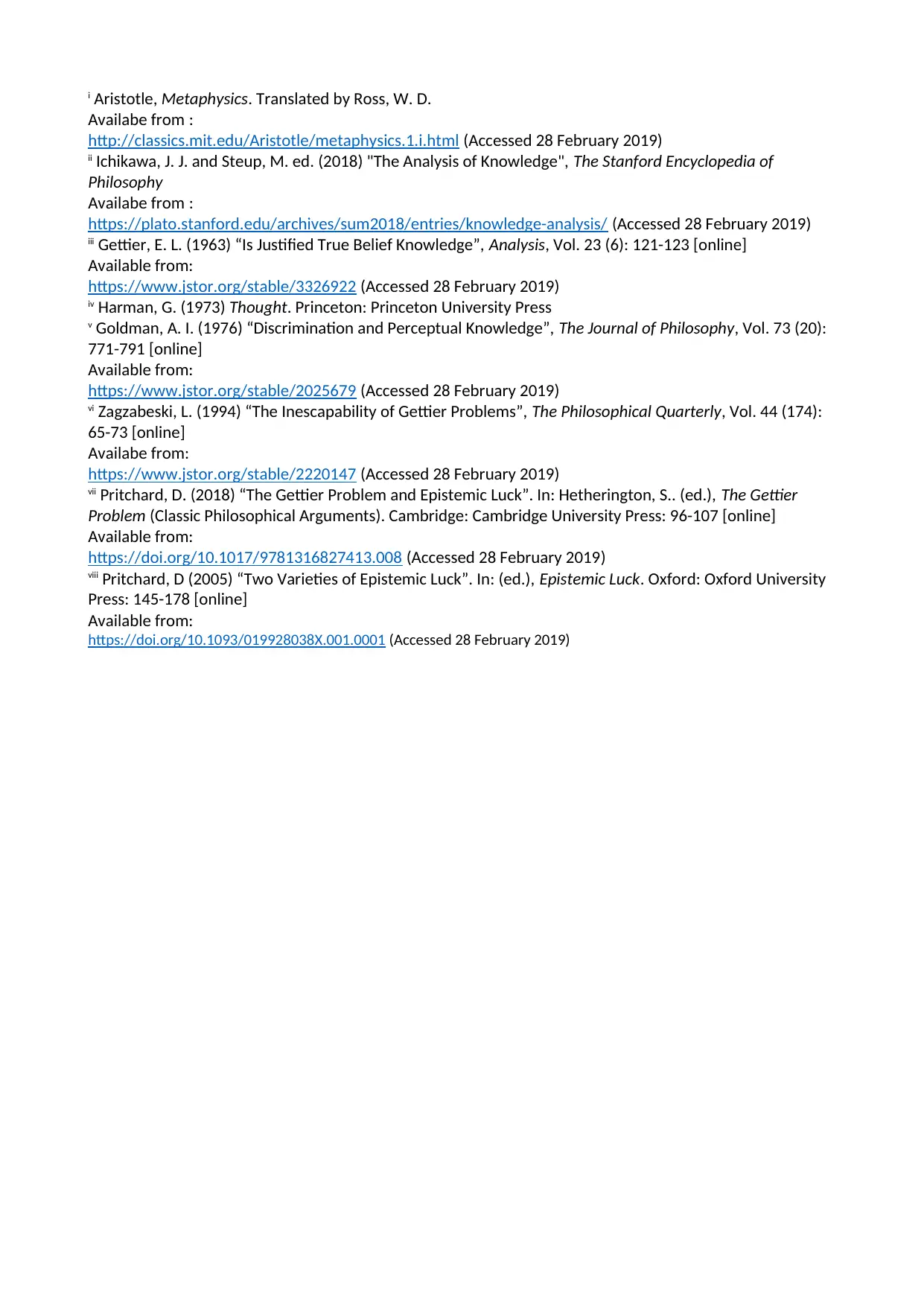Does Gettier Succeed? Analyzing Knowledge and Justified True Belief
VerifiedAdded on 2021/02/08
|4
|1711
|341
Essay
AI Summary
This essay critically examines Edmund Gettier's influential critique of the justified-true-belief (JTB) model of knowledge. The essay begins by outlining the JTB model and then presents Gettier's counterexamples, which demonstrate that justified true belief is not sufficient for knowledge. The essay then explores responses to Gettier's challenge, including Gilbert Harman's "no-false-lemmas" condition and Duncan Pritchard's anti-luck epistemology. It analyzes the strengths and weaknesses of each response, ultimately arguing that Pritchard's account of epistemic luck is more successful in addressing Gettier's problem. The essay concludes that while Gettier's cases highlight the need for a more nuanced understanding of knowledge, they do not definitively prove that knowledge cannot be analyzed. The essay also acknowledges that further research is needed to fully understand the nature of knowledge, including the role of cognitive agency in the acquisition of knowledge.

STUDENT ID: 1807822
What is an analysis of knowledge? Does Gettier succeed in showing that knowledge cannot
be analysed as justified true belief?
This essay will tackle the problem of analysing knowledge and whether such a concept can be
analysed. The focus will be directed towards Gettier’s critique of the justified-true-belief (“JTB”)
model for knowledge. By assessing responses from Harman and Pritchard, I will argue that – although
Gettier does not succeed in demonstrating the model as false – the paper is influential in identifying
the need to revise the definitions of the conditions stated in the JTB model.
“All men by nature desire to know”i. Aristotle’s quote underpins the human quest for knowledge but
this in turn requires a definition for such a concept. Within epistemology, this analysis of knowledge
concerns the identification of “conditions that are individually necessary and jointly sufficient for
propositional knowledge”ii. This can be expressed as,
S knows that P iff x1, x2, … , xn
Whereby each individual condition is required – with its removal leading to the collapse of the model
– but cannot hold on its lonesome. The project of this analysis is to produce a model that includes all
cases which account for “knowledge” while excluding those that do not.
In 1963, Edmund Gettier published a paperiii to argue the alleged incoherency of one of the most
widely known theories on what constitutes knowledge: the JTB model, which states that,
S knows that P iff
(1) P is true [“Truth” condition]
(2) S believes that P, and [“Belief” condition]
(3) S is justified in believing that P [“Justification” condition]
Gettier’s argument hinges on his two cases that demonstrate the three conditions “are true for some
proposition, though it is at the same time false that the person in question knows that proposition”
(Gettier, 1963). In other words, S’s “knowledge” is inferred from a justified false belief.
Gettier’s case is as follows: suppose Smith and Jones are at a job interview and Smith holds with
strong evidence that,
(a) Jones is the man who will get the job, and Jones has 10 coins in his pocket.
Such a proposition entails that,
(b) The man who will get the job has 10 coins in his pocket.
Given Smith has strong evidence for (b), acknowledges its entailment from (a), believes the
proposition is true and it is in fact true, naturally, it follows that as Jones has 10 coins in his pocket
Jones will get the job. Yet, ponder that, in fact,
(c) Smith is the man who will get the job, and is unaware that he also has 10 coins in his
pocket
As such (b) remains true although (a) is now false. As demonstrated, Smith knows (b) – under the
JTB model since it satisfies all three conditions. However, equally, Smith does not know (b) is true
since the belief is based on inference from (a) without recognising the number of coins in his own
pocket; falsely believing Jones to be the man who will get the job.
These ‘Gettier cases’ can be replicated with a similar structure to highlight the possibility for S to be
justified in believing a falsehood since, by luck, something that is true may be correctly deduced from
What is an analysis of knowledge? Does Gettier succeed in showing that knowledge cannot
be analysed as justified true belief?
This essay will tackle the problem of analysing knowledge and whether such a concept can be
analysed. The focus will be directed towards Gettier’s critique of the justified-true-belief (“JTB”)
model for knowledge. By assessing responses from Harman and Pritchard, I will argue that – although
Gettier does not succeed in demonstrating the model as false – the paper is influential in identifying
the need to revise the definitions of the conditions stated in the JTB model.
“All men by nature desire to know”i. Aristotle’s quote underpins the human quest for knowledge but
this in turn requires a definition for such a concept. Within epistemology, this analysis of knowledge
concerns the identification of “conditions that are individually necessary and jointly sufficient for
propositional knowledge”ii. This can be expressed as,
S knows that P iff x1, x2, … , xn
Whereby each individual condition is required – with its removal leading to the collapse of the model
– but cannot hold on its lonesome. The project of this analysis is to produce a model that includes all
cases which account for “knowledge” while excluding those that do not.
In 1963, Edmund Gettier published a paperiii to argue the alleged incoherency of one of the most
widely known theories on what constitutes knowledge: the JTB model, which states that,
S knows that P iff
(1) P is true [“Truth” condition]
(2) S believes that P, and [“Belief” condition]
(3) S is justified in believing that P [“Justification” condition]
Gettier’s argument hinges on his two cases that demonstrate the three conditions “are true for some
proposition, though it is at the same time false that the person in question knows that proposition”
(Gettier, 1963). In other words, S’s “knowledge” is inferred from a justified false belief.
Gettier’s case is as follows: suppose Smith and Jones are at a job interview and Smith holds with
strong evidence that,
(a) Jones is the man who will get the job, and Jones has 10 coins in his pocket.
Such a proposition entails that,
(b) The man who will get the job has 10 coins in his pocket.
Given Smith has strong evidence for (b), acknowledges its entailment from (a), believes the
proposition is true and it is in fact true, naturally, it follows that as Jones has 10 coins in his pocket
Jones will get the job. Yet, ponder that, in fact,
(c) Smith is the man who will get the job, and is unaware that he also has 10 coins in his
As such (b) remains true although (a) is now false. As demonstrated, Smith knows (b) – under the
JTB model since it satisfies all three conditions. However, equally, Smith does not know (b) is true
since the belief is based on inference from (a) without recognising the number of coins in his own
pocket; falsely believing Jones to be the man who will get the job.
These ‘Gettier cases’ can be replicated with a similar structure to highlight the possibility for S to be
justified in believing a falsehood since, by luck, something that is true may be correctly deduced from
Paraphrase This Document
Need a fresh take? Get an instant paraphrase of this document with our AI Paraphraser

STUDENT ID: 1807822
What is an analysis of knowledge? Does Gettier succeed in showing that knowledge cannot
be analysed as justified true belief?
a false belief. As a consequence, Gettier concludes that the JTB model is inadequate and does not
“state a sufficient condition for someone’s knowing a given proposition” (Gettier, 1963).
In order to respond to Gettier, one may seek to simply defend the JTB tri-partite analysis by arguing S
is not justified or that S has knowledge. Yet, in Gettier’s example this response appears rather weak
since it does not rectify the issue Gettier raises with the JTB model concerning justified false beliefs.
Thus, it is more appropriate to amend the analysis by adding another necessary condition or revising
one of the three original conditions. Gilbert Harman in Thought (1973)iv alludes to the addition of the
following condition,
(4) S’s belief that P is not inferred from any falsehood.
This can be also seen to state that there is no wrong move in S’s logical reasoning as the justification
rests on “no-false-lemmas”. With the addition of (4), Gettier’s example ceases to be a problem as it
no longer sufficiently constitutes knowledge.
However, Harman’s notion of an intact chain of reasoning rests upon the involvement of inference.
Yet, there are arguably Gettier cases – take Alvin Goldman’s Barn Facades– providing no knowledge
even when JTB and (4) are met. Suppose Henry has “no doubt about the identity of” a barn and is
driving through an area “full of papier-mâché facsimiles of barns”. Postulate now that Henry sees and
identifies a barn. Yet, by luck, the object is a genuine barn. Regardless if it were a façade, Henry
would form the same belief and “we would be strongly inclined to withdraw the claim that Henry
knows this object is a barn” (Goldman, 1976)v.
Goldman’s example meets condition (4) since Henry’s belief that it is barn is not falsely justified and
thus an example of a Gettier case resistant to Harman’s modification. Alas, more worryingly, it is an
example that jeopardises the ability for Harman’s modification to act as a general solution as Gettier
cases can be merely adapted.
This point was developed further, in 1994, by Linda Zagzebski who suggested – after decades of
failed attempts1 in resolving the Gettier problem – that JTB+X models of knowledge2 would always
fall prey to a Gettier case. The “general rule” requires, first, for a case where S holds a belief meets
JTB-X but then, secondly, have the belief true by luck. Even though the “belief is true … it is not
knowledge” (Zagzabeski, 1994)vi. More damningly though, the Gettier problem is left unresolved and
appears to have succeeded in showing that knowledge cannot be analysed as JTB or even at all.
Nevertheless, there is an important aspect that Zagzbeski touches on which may assist in refuting
Gettier: epistemic luck. Duncan Pritchard argues that, on further reading, the “Gettier problem is
concerned with determining what the anti-luck condition on knowledge is” (Pritchard, 2018)vii.
Pritchard’s primary focus is on how a belief is formed and whether certain formations, based upon a
distinctive type of luck, undermine knowledge. This can be seen as a revision of the conditions within
the JTB model, particularly the “truth condition”.
Thus, for Pritchard, this anti-luck condition is an amalgamation of an account of luck and sense of
when “knowledge is incompatible with luck” (Pritchard, 2018). Pritchard views luck as a “modal
notion” whereby any event, E, “could very easily have not occurred” keeping relevant initial
conditions. He then combines this account with his concept of vertic epistemic luck where it is a
1 Ironically, Goldman admits his own earlier “casual analysis cannot handle the [Barn-Façade] problem either”
(Goldman, 1976)
2 Where X is a set of conditions independent from JTB
What is an analysis of knowledge? Does Gettier succeed in showing that knowledge cannot
be analysed as justified true belief?
a false belief. As a consequence, Gettier concludes that the JTB model is inadequate and does not
“state a sufficient condition for someone’s knowing a given proposition” (Gettier, 1963).
In order to respond to Gettier, one may seek to simply defend the JTB tri-partite analysis by arguing S
is not justified or that S has knowledge. Yet, in Gettier’s example this response appears rather weak
since it does not rectify the issue Gettier raises with the JTB model concerning justified false beliefs.
Thus, it is more appropriate to amend the analysis by adding another necessary condition or revising
one of the three original conditions. Gilbert Harman in Thought (1973)iv alludes to the addition of the
following condition,
(4) S’s belief that P is not inferred from any falsehood.
This can be also seen to state that there is no wrong move in S’s logical reasoning as the justification
rests on “no-false-lemmas”. With the addition of (4), Gettier’s example ceases to be a problem as it
no longer sufficiently constitutes knowledge.
However, Harman’s notion of an intact chain of reasoning rests upon the involvement of inference.
Yet, there are arguably Gettier cases – take Alvin Goldman’s Barn Facades– providing no knowledge
even when JTB and (4) are met. Suppose Henry has “no doubt about the identity of” a barn and is
driving through an area “full of papier-mâché facsimiles of barns”. Postulate now that Henry sees and
identifies a barn. Yet, by luck, the object is a genuine barn. Regardless if it were a façade, Henry
would form the same belief and “we would be strongly inclined to withdraw the claim that Henry
knows this object is a barn” (Goldman, 1976)v.
Goldman’s example meets condition (4) since Henry’s belief that it is barn is not falsely justified and
thus an example of a Gettier case resistant to Harman’s modification. Alas, more worryingly, it is an
example that jeopardises the ability for Harman’s modification to act as a general solution as Gettier
cases can be merely adapted.
This point was developed further, in 1994, by Linda Zagzebski who suggested – after decades of
failed attempts1 in resolving the Gettier problem – that JTB+X models of knowledge2 would always
fall prey to a Gettier case. The “general rule” requires, first, for a case where S holds a belief meets
JTB-X but then, secondly, have the belief true by luck. Even though the “belief is true … it is not
knowledge” (Zagzabeski, 1994)vi. More damningly though, the Gettier problem is left unresolved and
appears to have succeeded in showing that knowledge cannot be analysed as JTB or even at all.
Nevertheless, there is an important aspect that Zagzbeski touches on which may assist in refuting
Gettier: epistemic luck. Duncan Pritchard argues that, on further reading, the “Gettier problem is
concerned with determining what the anti-luck condition on knowledge is” (Pritchard, 2018)vii.
Pritchard’s primary focus is on how a belief is formed and whether certain formations, based upon a
distinctive type of luck, undermine knowledge. This can be seen as a revision of the conditions within
the JTB model, particularly the “truth condition”.
Thus, for Pritchard, this anti-luck condition is an amalgamation of an account of luck and sense of
when “knowledge is incompatible with luck” (Pritchard, 2018). Pritchard views luck as a “modal
notion” whereby any event, E, “could very easily have not occurred” keeping relevant initial
conditions. He then combines this account with his concept of vertic epistemic luck where it is a
1 Ironically, Goldman admits his own earlier “casual analysis cannot handle the [Barn-Façade] problem either”
(Goldman, 1976)
2 Where X is a set of conditions independent from JTB

STUDENT ID: 1807822
What is an analysis of knowledge? Does Gettier succeed in showing that knowledge cannot
be analysed as justified true belief?
“matter of luck that the agent’s belief is true” which is malignant3 since it does not sufficiently entail
knowledge (Pritchard, 2005)viii. Applying this to Goldman’s Barn Façade case clearly dismisses
Henry’s belief of the barn as genuine knowledge; it has occurred by luck since it could have very
easily been a facade. In a similar fashion, it resolves Zagzabeski-formulations of the general Gettier
case which rely upon luck and concludes that Gettier does not succeed in his critique of the JTB
model. However, it is worth noting Pritchard holds that the addition of the anti-luck condition to the
JTB model is still not sufficient for a theory of knowledge. There is the need to develop an anti-luck
virtue epistemology where the virtue captures “the subject’s cognitive agency” having remarked on
the need for “nonlucky cognitive success” (Pritchard, 2018). This, indeed, is very promising for
delivering a coherent analysis of knowledge in the future.
Personally, the anti-luck epistemology advocated by Pritchard is more successful than Harman’s “no-
false-lemmas” approach and sufficient in dismissing Gettier’s paper. Even though the latter resolves
an assumption held by Gettier that one can possess a justified false belief, within the JTB model, it
succumbs to counter examples like Goldman’s Barn Country Case. However, Pritchard, by directly
confronting veritc luck, resolves the problems proposed by Gettier and any re-formulation under
Zagzabeski’s general rule. Thus, to conclude, Gettier ultimately fails in showing that knowledge
cannot be analysed as JTB as – when supplemented by Pritchard’s account of knowledge – Gettier’s
cases are no longer problematic. Yet there are still intuitions about knowledge – such as the subject’s
cognitive ability – that need to be tested for the formulation of a model that contains conditions which
are individually necessary and jointly sufficient for a theory of knowledge.
WORD COUNT: 1401
3 Although Pritchard (2005) identifies two varieties of malignant epistemic luck, for simplicity, emphasis is
drawn to the concept of veritic epistemic luck over reflective epistemic luck (“Given only what the agent is able
to know by reflection alone, it is a matter of luck that her belief is true”).
What is an analysis of knowledge? Does Gettier succeed in showing that knowledge cannot
be analysed as justified true belief?
“matter of luck that the agent’s belief is true” which is malignant3 since it does not sufficiently entail
knowledge (Pritchard, 2005)viii. Applying this to Goldman’s Barn Façade case clearly dismisses
Henry’s belief of the barn as genuine knowledge; it has occurred by luck since it could have very
easily been a facade. In a similar fashion, it resolves Zagzabeski-formulations of the general Gettier
case which rely upon luck and concludes that Gettier does not succeed in his critique of the JTB
model. However, it is worth noting Pritchard holds that the addition of the anti-luck condition to the
JTB model is still not sufficient for a theory of knowledge. There is the need to develop an anti-luck
virtue epistemology where the virtue captures “the subject’s cognitive agency” having remarked on
the need for “nonlucky cognitive success” (Pritchard, 2018). This, indeed, is very promising for
delivering a coherent analysis of knowledge in the future.
Personally, the anti-luck epistemology advocated by Pritchard is more successful than Harman’s “no-
false-lemmas” approach and sufficient in dismissing Gettier’s paper. Even though the latter resolves
an assumption held by Gettier that one can possess a justified false belief, within the JTB model, it
succumbs to counter examples like Goldman’s Barn Country Case. However, Pritchard, by directly
confronting veritc luck, resolves the problems proposed by Gettier and any re-formulation under
Zagzabeski’s general rule. Thus, to conclude, Gettier ultimately fails in showing that knowledge
cannot be analysed as JTB as – when supplemented by Pritchard’s account of knowledge – Gettier’s
cases are no longer problematic. Yet there are still intuitions about knowledge – such as the subject’s
cognitive ability – that need to be tested for the formulation of a model that contains conditions which
are individually necessary and jointly sufficient for a theory of knowledge.
WORD COUNT: 1401
3 Although Pritchard (2005) identifies two varieties of malignant epistemic luck, for simplicity, emphasis is
drawn to the concept of veritic epistemic luck over reflective epistemic luck (“Given only what the agent is able
to know by reflection alone, it is a matter of luck that her belief is true”).
⊘ This is a preview!⊘
Do you want full access?
Subscribe today to unlock all pages.

Trusted by 1+ million students worldwide

i Aristotle, Metaphysics. Translated by Ross, W. D.
Availabe from :
http://classics.mit.edu/Aristotle/metaphysics.1.i.html (Accessed 28 February 2019)
ii Ichikawa, J. J. and Steup, M. ed. (2018) "The Analysis of Knowledge", The Stanford Encyclopedia of
Philosophy
Availabe from :
https://plato.stanford.edu/archives/sum2018/entries/knowledge-analysis/ (Accessed 28 February 2019)
iii Gettier, E. L. (1963) “Is Justified True Belief Knowledge”, Analysis, Vol. 23 (6): 121-123 [online]
Available from:
https://www.jstor.org/stable/3326922 (Accessed 28 February 2019)
iv Harman, G. (1973) Thought. Princeton: Princeton University Press
v Goldman, A. I. (1976) “Discrimination and Perceptual Knowledge”, The Journal of Philosophy, Vol. 73 (20):
771-791 [online]
Available from:
https://www.jstor.org/stable/2025679 (Accessed 28 February 2019)
vi Zagzabeski, L. (1994) “The Inescapability of Gettier Problems”, The Philosophical Quarterly, Vol. 44 (174):
65-73 [online]
Availabe from:
https://www.jstor.org/stable/2220147 (Accessed 28 February 2019)
vii Pritchard, D. (2018) “The Gettier Problem and Epistemic Luck”. In: Hetherington, S.. (ed.), The Gettier
Problem (Classic Philosophical Arguments). Cambridge: Cambridge University Press: 96-107 [online]
Available from:
https://doi.org/10.1017/9781316827413.008 (Accessed 28 February 2019)
viii Pritchard, D (2005) “Two Varieties of Epistemic Luck”. In: (ed.), Epistemic Luck. Oxford: Oxford University
Press: 145-178 [online]
Available from:
https://doi.org/10.1093/019928038X.001.0001 (Accessed 28 February 2019)
Availabe from :
http://classics.mit.edu/Aristotle/metaphysics.1.i.html (Accessed 28 February 2019)
ii Ichikawa, J. J. and Steup, M. ed. (2018) "The Analysis of Knowledge", The Stanford Encyclopedia of
Philosophy
Availabe from :
https://plato.stanford.edu/archives/sum2018/entries/knowledge-analysis/ (Accessed 28 February 2019)
iii Gettier, E. L. (1963) “Is Justified True Belief Knowledge”, Analysis, Vol. 23 (6): 121-123 [online]
Available from:
https://www.jstor.org/stable/3326922 (Accessed 28 February 2019)
iv Harman, G. (1973) Thought. Princeton: Princeton University Press
v Goldman, A. I. (1976) “Discrimination and Perceptual Knowledge”, The Journal of Philosophy, Vol. 73 (20):
771-791 [online]
Available from:
https://www.jstor.org/stable/2025679 (Accessed 28 February 2019)
vi Zagzabeski, L. (1994) “The Inescapability of Gettier Problems”, The Philosophical Quarterly, Vol. 44 (174):
65-73 [online]
Availabe from:
https://www.jstor.org/stable/2220147 (Accessed 28 February 2019)
vii Pritchard, D. (2018) “The Gettier Problem and Epistemic Luck”. In: Hetherington, S.. (ed.), The Gettier
Problem (Classic Philosophical Arguments). Cambridge: Cambridge University Press: 96-107 [online]
Available from:
https://doi.org/10.1017/9781316827413.008 (Accessed 28 February 2019)
viii Pritchard, D (2005) “Two Varieties of Epistemic Luck”. In: (ed.), Epistemic Luck. Oxford: Oxford University
Press: 145-178 [online]
Available from:
https://doi.org/10.1093/019928038X.001.0001 (Accessed 28 February 2019)
1 out of 4
Your All-in-One AI-Powered Toolkit for Academic Success.
+13062052269
info@desklib.com
Available 24*7 on WhatsApp / Email
![[object Object]](/_next/static/media/star-bottom.7253800d.svg)
Unlock your academic potential
Copyright © 2020–2026 A2Z Services. All Rights Reserved. Developed and managed by ZUCOL.